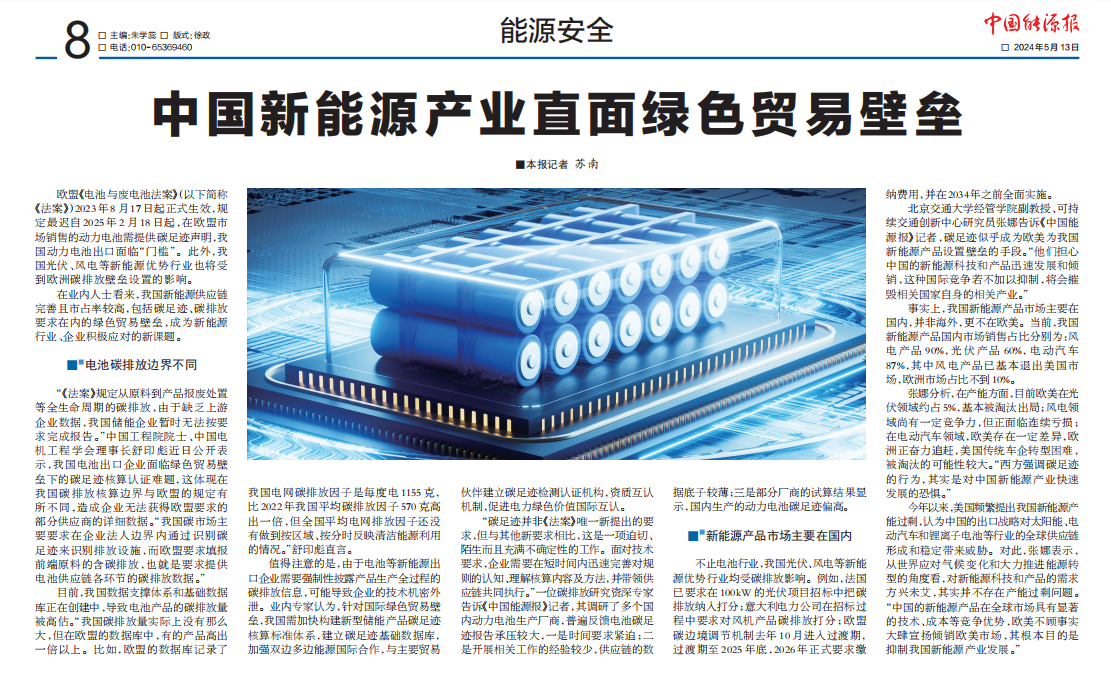
The EU Battery and Spent Battery Act (hereinafter referred to as the "Act") will come into force on August 17, 2023, which stipulates that power batteries sold in the EU market must provide a carbon footprint statement at the latest from February 18, 2025, and China's power battery export faces a "threshold". In addition, China's new energy advantageous industries such as photovoltaic and wind power will also be affected by the setting of European carbon emission barriers. In the view of insiders, China's new energy supply chain is complete and has a high market share. Green trade barriers, including carbon footprint and carbon emission requirements, have become a new subject for the new energy industry and enterprises to actively respond to. Zhang Na, associate professor of the School of Economics and Management of Beijing Jiaotong University and researcher of the Sustainable Transportation Innovation Center, has been committed to new energy and energy security research for many years. Recently, she was interviewed by China Energy News, and expressed her views on the green trade barriers facing China's new energy industry.
Not only the battery industry, but also China's photovoltaic, wind power and other new energy industries are affected by carbon emissions. For example, France has requested that carbon emissions be included in the bidding for 100kW photovoltaic projects; During the bidding process, Italian Electric Power Company requires to score the carbon emissions of wind turbine products; The EU's carbon border adjustment mechanism entered a transition period last October. The transition period will end at the end of 2025, and fees will be formally required in 2026, and will be fully implemented before 2034. She believes that carbon footprint seems to be a means for Europe and the United States to set barriers for China's new energy products. Europe and the United States are worried about the rapid development and dumping of China's new energy technologies and products. If this international competition is not suppressed, it will destroy the relevant industries of the relevant countries themselves.
In fact, China's new energy product market is mainly in China, not overseas, let alone Europe and the United States. At present, the domestic market sales of new energy products in China account for 90% of wind power products, 60% of photovoltaic products, and 87% of electric vehicles, of which wind power products have basically withdrawn from the U.S. market, while the European market accounts for less than 10%.
Zhang Na analyzed that in terms of production capacity, Europe and the United States currently account for about 5% in the photovoltaic field, which is basically eliminated; The wind power sector is still competitive, but is facing continuous losses; In the field of electric vehicles, there are some differences between Europe and the United States. Europe is struggling to catch up. The transformation of American traditional car companies is difficult, and the possibility of being eliminated is high. "The western emphasis on carbon footprint is actually a fear of the rapid development of China's new energy industry."
Since this year, the United States has frequently raised China's overcapacity in new energy, arguing that China's export strategy poses a threat to the formation and stability of global supply chains in solar, electric vehicles, lithium-ion batteries and other industries. In this regard, Zhang Na said that from the perspective of the world's response to climate change and vigorously promoting energy transformation, the demand for new energy technologies and products is on the rise, but there is no overcapacity problem. "China's new energy products have significant competitive advantages in technology, cost and other aspects in the global market. Europe and the United States, regardless of the facts, are vigorously promoting dumping in the European and American markets, the fundamental purpose of which is to curb the development of China's new energy industry."





